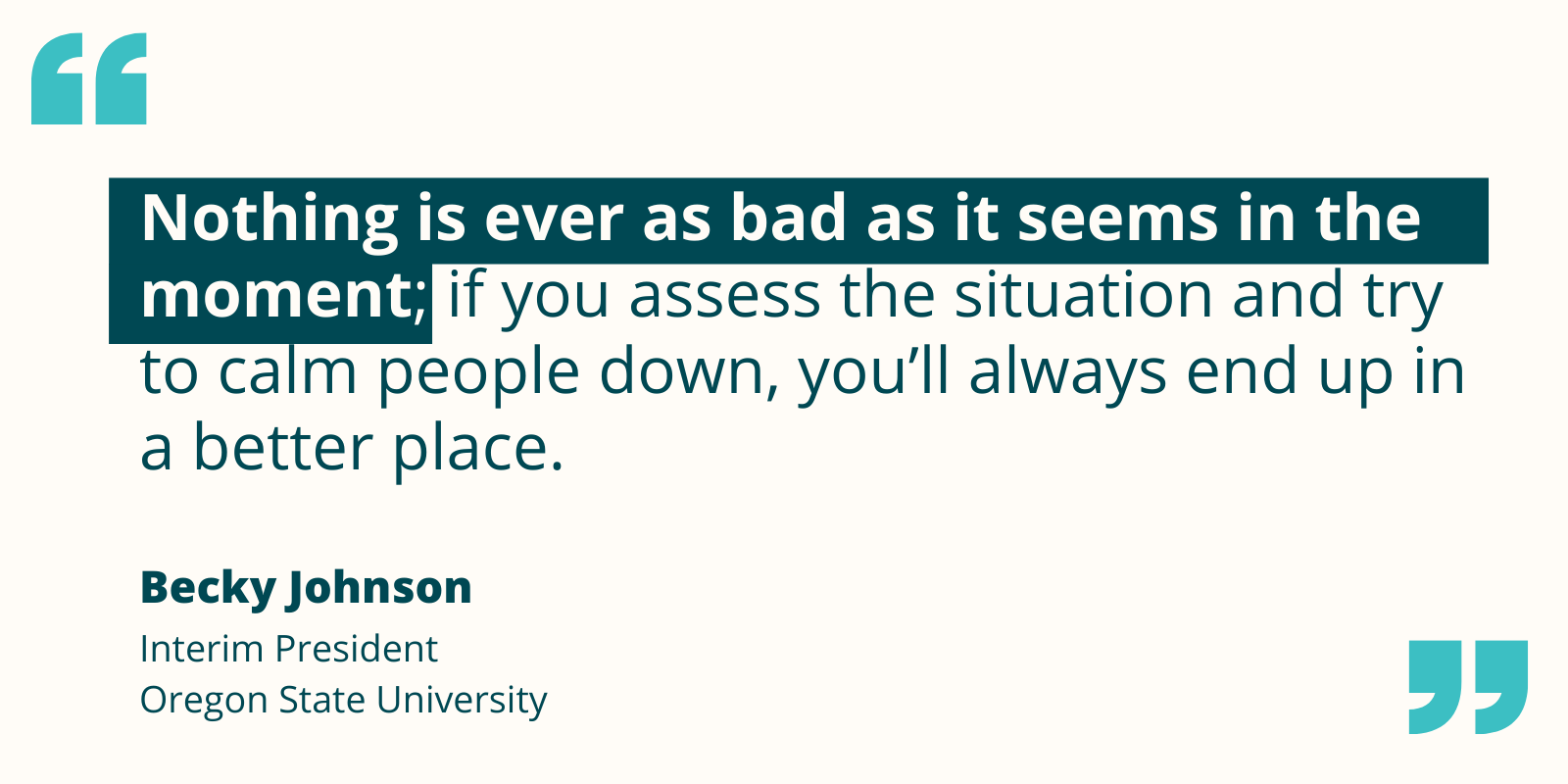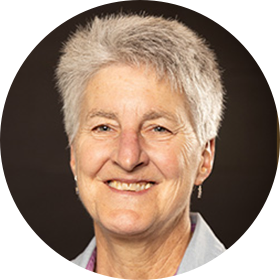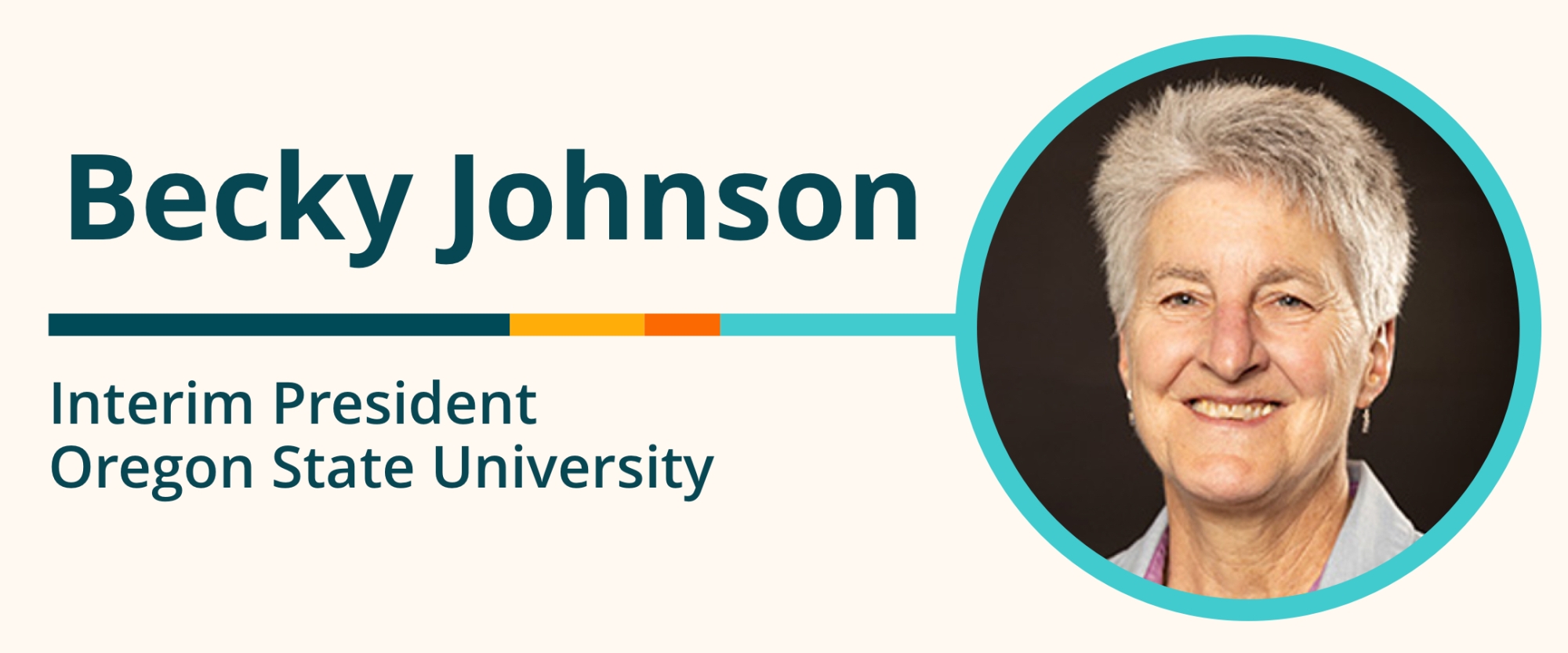We caught up with Dr. Becky Johnson, Interim President at Oregon State University, as our guest for the Weekly Wisdom Podcast. She graciously answered our questions about effectively assuming a leadership role during a pandemic, not being driven by worst-case scenarios, and keeping an eye on the future while handling the current situation.
Keeping Calm
President Johnson was approaching the end of her career at OSU-Cascades when she accepted the interim leadership post in Corvallis. She's well known for her calmness, and we asked her to share her secret for staying that way in these challenging times.
"I don’t think I’m really a patient person," she admitted, "but I think you learn by observing people who do it badly. When you see people who panic, you realize that nothing is ever as bad as it seems in the moment, and that if you just step back and assess the situation, look at the alternatives, and try to calm people down, you’ll always end up in a better place. I see this in younger leaders, especially younger women leaders, because I think we all suffer a little bit from impostor syndrome. We have this fear of making a wrong decision or of failure, and it tends to create anxiety. My advice is to always take time. If you can’t take a day, at least take a few minutes; but don’t just react. You, as a leader, need to project calm and confidence and that you have this situation under control, and things are not going to fall apart." Recognizing that some leaders also exaggerate the upside, she added, "It’s really important to manage expectations in both directions and try to keep things on a steady course."

Assessing the Situation
Of course, leadership is about more than projecting calm and managing expectations. President Johnson was happy to discuss practical strategies.
"Find out what people are worried about," she told us. "Find out what their challenges are. Assess what we can do about them. We can’t do everything about everyone’s fears. You know, with the pandemic, people are going to the worst-case scenario all the time. You hear from a vocal minority who want you to eliminate every risk, and of course we have to figure out how to live with risk. You have to identify those risks, but then make the decisions to move forward where you can. Don’t come into a leadership situation like this one thinking that you’re going to have some grand, big vision, and here’s our opportunity to go in a different direction. That’s not what the institution needs in that situation. We need to make sure that people are focusing on the direction that we were already going, which was great; and when I’m not interim and the new person comes in, that would be the time to think about new strategies, new visions."
Confidence Is Crucial
President Johnson acknowledged that, in some ways, continuity may be more important than who's actually in charge.
"The previous leader was only here for about nine months," she explained. "Unfortunately it was during the middle of COVID, so people didn’t really get to know him. I think that was difficult to be in a crisis situation when no one has gained trust in you. I was chosen for the role because they’ve known me for 37 years at Oregon State University. In addition to being someone that people know and trust, you also have to restore the sense that the things that are important – teaching students, doing research, doing outreach – don’t stop. The president could be anyone, and those things can still go on and be successful. Our faculty were still doing amazing research. Our students were learning. Our extension folks were out in every county doing what they do. We needed to remind them of that. Yes, we had a presidential transition; but things were really good, and we just have to restore that confidence and get people focused back on their day-to-day jobs that they do so well."
Getting Past the Pandemic
Without downplaying COVID preparedness and community safety, President Johnson believes that it's important to look beyond the pandemic, even if it's still going to be with us for a while.
"I felt like we almost got into planning paralysis," she observed. "There’s lots of other things that administrators need to be working on, and all we were doing was planning – usually for the worst-case scenario instead of the most likely scenario, because sometimes you have your general counsel in your ear always telling you to look out for the worst-case scenario. We had probably hundreds of people involved in planning nonstop. Of course, conditions kept changing, so every time, you had to go back and plan again. I’m not trying to put down planning. I mentioned the few vocal voices. Most of us have bargaining units at our institutions, and those vocal voices tend to get magnified through the bargaining units. But I’d like to make sure that we are not in a paralysis where we’re not remembering: What are we here for? What are the jobs that we’re here for, in terms of teaching students, and doing our research, and doing our outreach? I’d like to make sure that we’re not taking our eye off of that."
Among other issues, President Johnson hopes that OSU will continue pushing for equity.
"We need to focus on getting more underrepresented students into our institutions of higher education," she said. "Income inequality has just become a larger and larger problem in our society. The only way I see that we’re going to address that issue is to get more students into higher education, get them on a career path and into a good job. UIA is at the forefront of this, and these are efforts that all of our institutions are working on, but I don’t see that we’re making progress as fast as we’d like to. There’s still a wide discrepancy between who goes to college and who doesn’t. One of the things we need to do more of is working with our K-12 partners on this issue, because that’s where a lot of these students are lost. You’ve got to get them when they’re in middle school or before and get them thinking about going to college. I feel that the Alliance has been doing a good job of sharing information across institutions to increase access to higher education and increase success once they get there."
Who's on the Team? What's the Game Plan?
We always like to end the conversation by asking our guests for career advice: the best they ever received and wisdom they most commonly share.
"I still credit team sports with a lot of what I learned about leadership," said President Johnson, who played on the NCAA basketball and golf teams at University of Wisconsin. "I think that you learn about how important confidence is. If people go into a competition and the leaders aren’t confident, you’re not likely to win. It's incredibly important for leaders to display that confidence in all situations. The other thing is who’s on the team. You get to decide who you want to play with, because you want to win. Now, sometimes you get put in a situation where the team’s already there, and you’re put in as the leader. Sometimes you’ve got to move people around and find the right place for them. Sometimes you need to get new people. If you don’t have the right people on your team, you’re just not going to be successful.
"When I got to OSU-Cascades," she explained, "I discovered the importance of having a vision and doing what I think of sometimes as reverse engineering. I know where we want to be in five years, but where do we have to be next year; and then next month; and then this week? Everybody has to know what that plan is. Everybody has to buy into it and stick to it. Then you have to celebrate your wins. It just becomes contagious, and people get onboard."
President Johnson's advice to future higher ed leaders is rooted in being authentic. "Not everybody wants to be a president," she said. "Not everybody should be a president. Understand your own goals, your own personality, what you’re suited for. Find a path that’s right for you and find a way that it’s going to be rewarding. I’ve been at Oregon State my entire career, but I’ve changed positions probably five times. That was so energizing and so motivating, to move into a new position. Some people want to be a professor for their entire career, and that’s great, because people need to do that. That wasn’t me. I really did get energized by taking on new challenges and have really enjoyed moving into administration and trying to figure out how to help other people be successful."
Note: This interview in the Weekly Wisdom Series originally aired on November 1, 2021 as part of the University Innovation Alliance’s Innovating Together Podcast, appearing live on Facebook, Twitter, and LinkedIn.
Links Mentioned in This Episode
• Oregon State University
• OSU-Cascades
• Bargaining units (jobs represented by labor unions, as defined by the federal USAJOBS website)
• UIA (the University Innovation Alliance)
• Advice to future higher ed leaders ("Advice for New Presidents and Chancellors: 14 Pro Tips on Higher Education Leadership" by Bridget Burns, UIA Executive Director, 8/12/21)
Bios of Guest and Co-Hosts

Guest: Becky Johnson, Chancellor, California State University System
Dr. Rebecca “Becky” Johnson became interim president of Oregon State University (OSU) on May 1, 2021. Her appointment will last until a permanent president is in office. She works with students, faculty, staff, alumni, and stakeholders to advance the university’s Strategic Plan 4.0, and oversees the return to on-site and in-person activities for the 2021-22 academic year, with an emphasis on safety, equity, and programs addressing interpersonal violence and survivor support. Dr. Johnson joined OSU in 1984 as an assistant professor in the College of Forestry and advanced to become a full professor. She served as associate dean for academic affairs in the College of Forestry 2002-2005 and university vice provost for academic affairs and international programs 2005-2009. In 2002, she led the university’s efforts to write its first strategic plan, and in 2008 directed implementation of INTO OSU, a public-private partnership to drive internationalization efforts. Dr. Johnson served as vice president of OSU-Cascades in Bend since 2009. Under her leadership, OSU-Cascades progressed from an academic degree transfer program on the Central Oregon Community College campus to a four-year university now occupying 128 acres and able to serve 3,000-5,000 students. Dr. Johnson received a bachelor’s degree in economics from the University of Wisconsin-Madison, where she played on the NCAA basketball and golf teams, and a master’s and doctoral degree in agricultural economics from Michigan State University. She is OSU's first woman president. She and her partner, Lori Elkins, live in Corvallis.

Co-Host: Bridget Burns, Executive Director, University Innovation Alliance
Dr. Bridget Burns is the founding Executive Director of the University Innovation Alliance (UIA). For the past decade, she has advised university presidents, system chancellors, and state and federal policy leaders on strategies to expand access to higher education, address costs, and promote completion for students of all backgrounds. The UIA was developed during Bridget’s tenure as an American Council on Education (A.C.E.) Fellowship at Arizona State University. She held multiple roles within the Oregon University System, including serving as Chief of Staff and Senior Policy Advisor, where she won the national award for innovation in higher education government relations. She was a National Associate for the National Center for Public Policy and Higher Education, and has served on several statewide governing boards including ones governing higher education institutions, financial aid policy, and policy areas impacting children and families.

Co-Host: Doug Lederman, Editor and Co-Founder, Inside Higher Ed
Doug Lederman is editor and co-founder of Inside Higher Ed. With Scott Jaschik, he leads the site's editorial operations, overseeing news content, opinion pieces, career advice, blogs and other features. Doug speaks widely about higher education, including on C-Span and National Public Radio and at meetings and on campuses around the country. His work has appeared in The New York Times and USA Today, among other publications. Doug was managing editor of The Chronicle of Higher Education from 1999 to 2003, after working at The Chronicle since 1986 in a variety of roles. He has won three National Awards for Education Reporting from the Education Writers Association, including one for a 2009 series of Inside Higher Ed articles on college rankings. He began his career as a news clerk at The New York Times. He grew up in Shaker Heights, Ohio, and graduated in 1984 from Princeton University. Doug and his wife, Kate Scharff, live in Bethesda, MD.
About Weekly Wisdom
Weekly Wisdom is an event series that happens live on Facebook, Twitter, and LinkedIn. It also becomes a podcast episode. Every week, we join forces with Inside Higher Ed and talk with a sitting college president or chancellor about how they're specifically navigating the challenges of this moment. These conversations will be filled with practicable things you can do right now by unpacking how and why college leaders are making decisions within higher education. Hopefully, these episodes will also leave you with a sense of optimism and a bit of inspiration.
Rate, Review & Subscribe
Learn why hundreds of people have rated this new podcast 5 stars! Please join others and rate and review this podcast. This helps us reach and inform more people -- like you -- to help increase the number and diversity of college graduates in the United States.
Click here, scroll to the bottom, tap to rate with five stars, and select “Write a Review.” Then be sure to let us know what you loved most about the episode! Also, if you haven’t done so already, subscribe to the podcast. We’ll be adding a bunch of bonus episodes to the feed and, if you’re not subscribed, there’s a good chance you’ll miss out.

